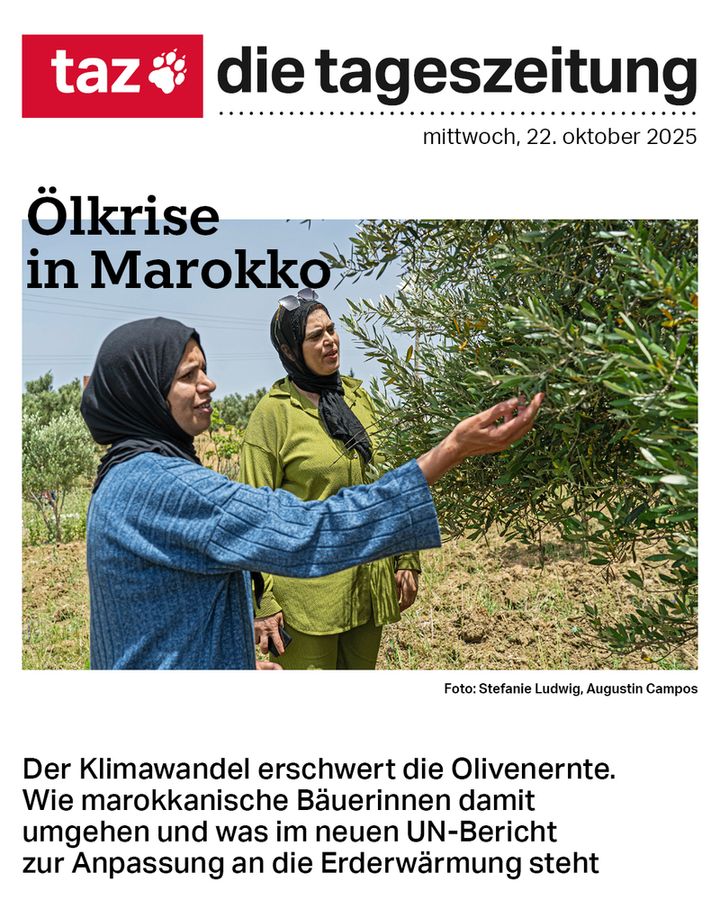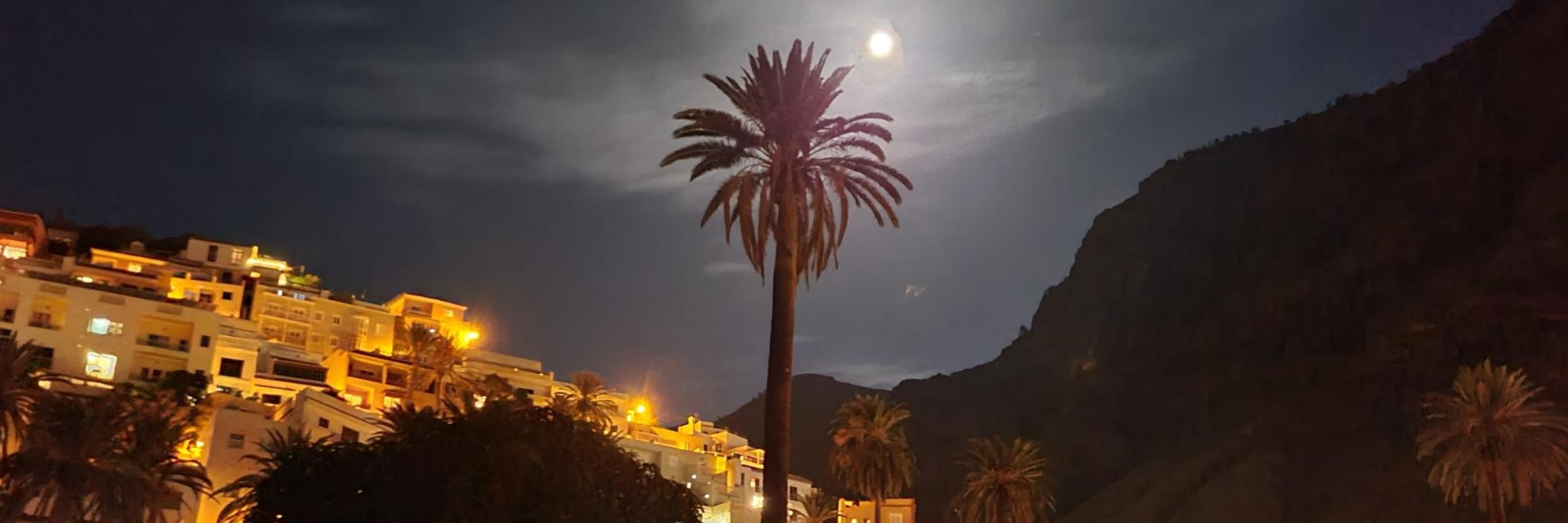
Teja Tscharntke
@teja-tscharntke.bsky.social
Professor of Agroecology
University of Göttingen, Germany
Functional Biodiversity in tropical & temperate landscapes
University of Göttingen, Germany
Functional Biodiversity in tropical & temperate landscapes
Reposted by Teja Tscharntke
People should absolutely be writing about how ICE's occupation of their cities is transforming life in these places, and they should be publishing it in print on paper - not just social media posts. There needs to be a record of this. Things are changing in measurable ways for the worse every day.
October 22, 2025 at 12:46 AM
People should absolutely be writing about how ICE's occupation of their cities is transforming life in these places, and they should be publishing it in print on paper - not just social media posts. There needs to be a record of this. Things are changing in measurable ways for the worse every day.
Reposted by Teja Tscharntke
PhD applications are now open @treesdla.bsky.social for 2026 intake. Have a look at a project on effects of forest diversity on floral reward production for pollinators that we advertise with @philstevenson.bsky.social. Do apply/get in touch if you are interested! www.trees-dla.ac.uk/projects/eff...
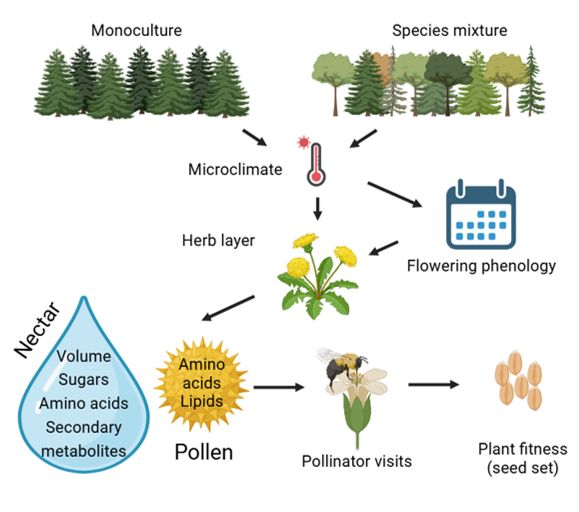
October 21, 2025 at 11:17 AM
PhD applications are now open @treesdla.bsky.social for 2026 intake. Have a look at a project on effects of forest diversity on floral reward production for pollinators that we advertise with @philstevenson.bsky.social. Do apply/get in touch if you are interested! www.trees-dla.ac.uk/projects/eff...
Reposted by Teja Tscharntke
Join the SCB Europe Fall Webinar 2025!
Thought-provoking sessions coming up this October & November:
20/22/29 Oct: DEIJ in conservation
23 Oct: Rethinking conservation narratives
7 Nov: Rights for organisms!
12 Nov: Habitat restoration & ecopsychology
Register here: bit.ly/4nYatdM
Thought-provoking sessions coming up this October & November:
20/22/29 Oct: DEIJ in conservation
23 Oct: Rethinking conservation narratives
7 Nov: Rights for organisms!
12 Nov: Habitat restoration & ecopsychology
Register here: bit.ly/4nYatdM

October 9, 2025 at 8:27 AM
Join the SCB Europe Fall Webinar 2025!
Thought-provoking sessions coming up this October & November:
20/22/29 Oct: DEIJ in conservation
23 Oct: Rethinking conservation narratives
7 Nov: Rights for organisms!
12 Nov: Habitat restoration & ecopsychology
Register here: bit.ly/4nYatdM
Thought-provoking sessions coming up this October & November:
20/22/29 Oct: DEIJ in conservation
23 Oct: Rethinking conservation narratives
7 Nov: Rights for organisms!
12 Nov: Habitat restoration & ecopsychology
Register here: bit.ly/4nYatdM
Reposted by Teja Tscharntke
What are the consequences of pollinator decline for wild plants? Here we try to find out in @valor-project.eu. Interesting observations. I never see Centaurea jacea flowers with pollen. But keep the pollinators away and the flowers are dusted white. Very popular species.
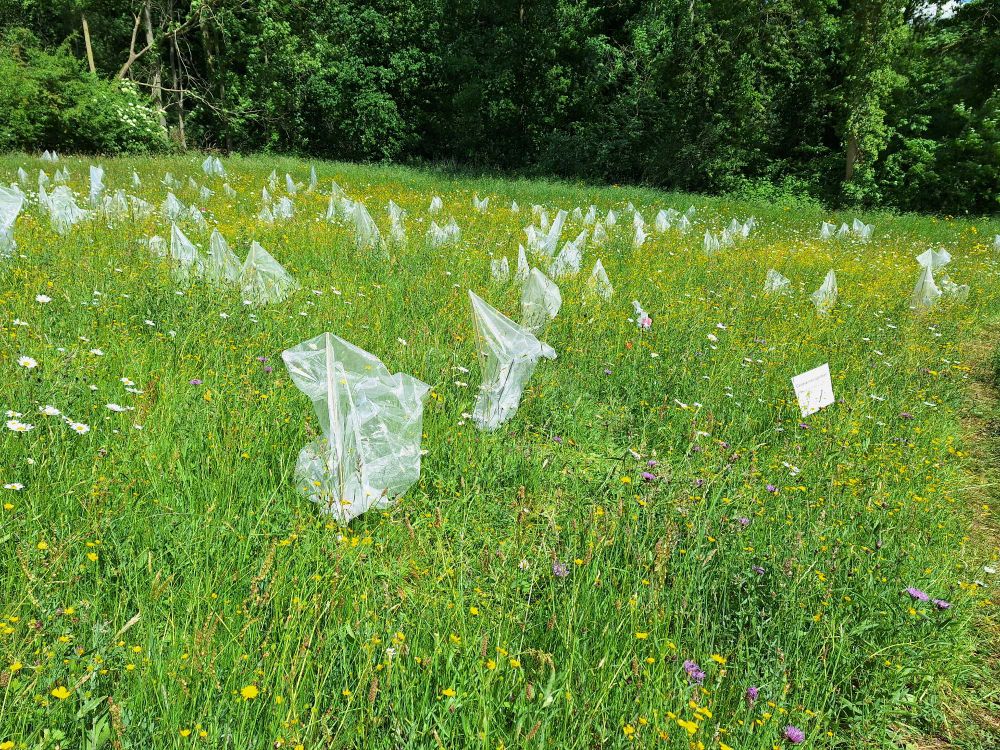
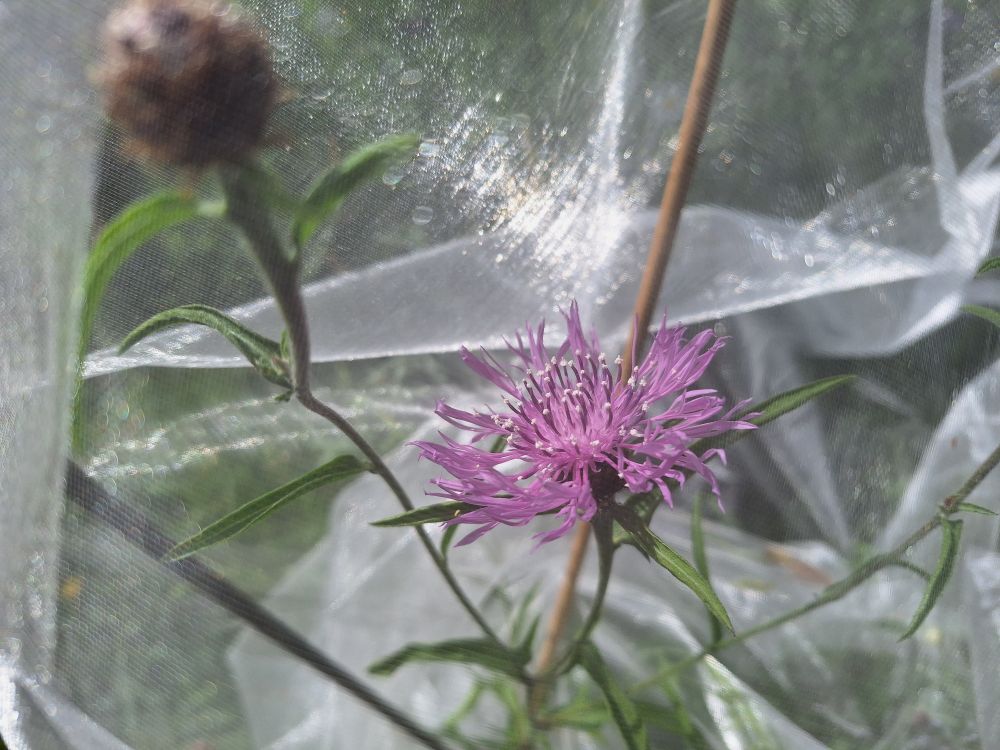
May 23, 2025 at 4:26 PM
What are the consequences of pollinator decline for wild plants? Here we try to find out in @valor-project.eu. Interesting observations. I never see Centaurea jacea flowers with pollen. But keep the pollinators away and the flowers are dusted white. Very popular species.
Reposted by Teja Tscharntke
Higher cutting frequency can restore habitat quality on farmland. doi.org/10.1111/1365...

September 27, 2025 at 4:01 PM
Higher cutting frequency can restore habitat quality on farmland. doi.org/10.1111/1365...
Reposted by Teja Tscharntke
Intensifying grassland management leads to massive loss of arthropod species. However, total arthropod numbers remain more or less stable. Many losers, few winners. doi.org/10.1016/j.bi...

October 10, 2025 at 12:05 PM
Intensifying grassland management leads to massive loss of arthropod species. However, total arthropod numbers remain more or less stable. Many losers, few winners. doi.org/10.1016/j.bi...
Reposted by Teja Tscharntke
Anyone thinking that having a car or two is ''quality of life'', should pay a visit to Paris to experience a city where a car is not only 'not necessary' but even a burden.
Paris was transformed by improving public transport, extending bike lanes, and by converting streets to green spaces. Amazing.
Paris was transformed by improving public transport, extending bike lanes, and by converting streets to green spaces. Amazing.


October 10, 2025 at 12:32 PM
Anyone thinking that having a car or two is ''quality of life'', should pay a visit to Paris to experience a city where a car is not only 'not necessary' but even a burden.
Paris was transformed by improving public transport, extending bike lanes, and by converting streets to green spaces. Amazing.
Paris was transformed by improving public transport, extending bike lanes, and by converting streets to green spaces. Amazing.
Reposted by Teja Tscharntke
Nobel Peace Prizes have often been awarded to people who fight autocracy. Maria Corina Machado fits right into that tradition
www.theatlantic.com/ideas/archiv...
www.theatlantic.com/ideas/archiv...

Why María Machado Deserved the Nobel Peace Prize
The Venezuelan opposition leader shows why participation matters.
www.theatlantic.com
October 10, 2025 at 12:42 PM
Nobel Peace Prizes have often been awarded to people who fight autocracy. Maria Corina Machado fits right into that tradition
www.theatlantic.com/ideas/archiv...
www.theatlantic.com/ideas/archiv...
Reposted by Teja Tscharntke
"World’s tropical forests are getting younger and that’s a major problem for the climate -- 140 million tons of above-ground carbon are lost per year because old-growth forests are being replaced by younger stands." 🌍 www.zmescience.com/ecology/worl...

World’s Tropical Forests are Getting Younger And That's Actually a Major Problem for the Climate
New research quantifying the global impact of forest age transitions found that 140 million tons of aboveground carbon are lost per year because of old-growth forests being replaced by younger stands.
www.zmescience.com
October 10, 2025 at 7:09 PM
"World’s tropical forests are getting younger and that’s a major problem for the climate -- 140 million tons of above-ground carbon are lost per year because old-growth forests are being replaced by younger stands." 🌍 www.zmescience.com/ecology/worl...
Reposted by Teja Tscharntke
Strips of land planted with flowers are much loved: they are beautiful and attract bees and insects. Is that enough for #Biodiversity? Researchers call for more diversity and collaboration across the landscape: www.uni-goettingen.de/en/3240.html...
#BiologicalConvervation: doi.org/10.1016/j.bi...
#BiologicalConvervation: doi.org/10.1016/j.bi...

September 29, 2025 at 10:59 AM
Strips of land planted with flowers are much loved: they are beautiful and attract bees and insects. Is that enough for #Biodiversity? Researchers call for more diversity and collaboration across the landscape: www.uni-goettingen.de/en/3240.html...
#BiologicalConvervation: doi.org/10.1016/j.bi...
#BiologicalConvervation: doi.org/10.1016/j.bi...
Reposted by Teja Tscharntke
Main Grape Varieties in Alsace, 1968-2022. Riesling's amazing surge from #3 to the undisputed #1. And Sylvaner's abysmal decline from #1 to #7.

October 1, 2025 at 4:43 PM
Main Grape Varieties in Alsace, 1968-2022. Riesling's amazing surge from #3 to the undisputed #1. And Sylvaner's abysmal decline from #1 to #7.
Reposted by Teja Tscharntke
#Wald im Umland fördert die #Artenvielfalt in Dörfern. Und Stadtnähe steigert das Wohlbefinden der Menschen dort. Das zeigen Untersuchungen in Ungarn und Rumänien. Mehr zur Studie: www.uni-goettingen.de/de/3240.html...
@agrarunigoe.bsky.social @funcagroeco.bsky.social @teja-tscharntke.bsky.social
@agrarunigoe.bsky.social @funcagroeco.bsky.social @teja-tscharntke.bsky.social
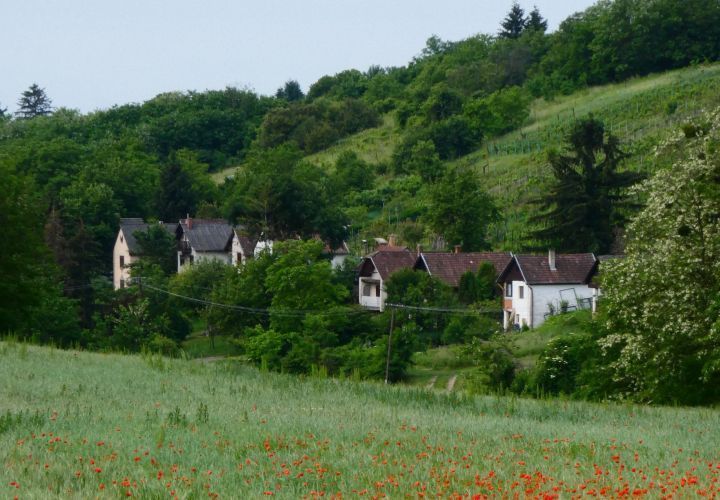
July 14, 2025 at 8:28 AM
#Wald im Umland fördert die #Artenvielfalt in Dörfern. Und Stadtnähe steigert das Wohlbefinden der Menschen dort. Das zeigen Untersuchungen in Ungarn und Rumänien. Mehr zur Studie: www.uni-goettingen.de/de/3240.html...
@agrarunigoe.bsky.social @funcagroeco.bsky.social @teja-tscharntke.bsky.social
@agrarunigoe.bsky.social @funcagroeco.bsky.social @teja-tscharntke.bsky.social
Reposted by Teja Tscharntke
While the prevalence of toxic agrochemicals in our food, water and urine tests is increasing,with known health impacts, and while the biodiversity crisis is accelerating, some agri ministers think that the best thing to do at the moment is to ease the route for approving agrochemicals.
Jetzt auch im DLF: Weniger Hürden für den Einsatz von Pflanzenschutzmitteln: Das fordern unionsgeführte Ministerien auf der Agrarministerkonferenz der Länder. www.deutschlandfunk.de/berliner-ges... #pestizide #Landwirtschaft

Landwirtschaft - Agrarminister fordern einfachere Zulassung von Pestiziden
Pflanzenschutzmittel sollten leichter zugelassen werden: Das fordern Unions-Agrarminister der Länder - auch wegen Belastungen durch den Klimawandel.
www.deutschlandfunk.de
September 27, 2025 at 5:07 PM
While the prevalence of toxic agrochemicals in our food, water and urine tests is increasing,with known health impacts, and while the biodiversity crisis is accelerating, some agri ministers think that the best thing to do at the moment is to ease the route for approving agrochemicals.
Reposted by Teja Tscharntke
We need much more semi-natural habitat (6-37%, depending on species group) in agricultural landscapes to effectively conserve pollinators. Large collaborative synthesis study looking at 59 studies in 1250 landscapes from 19 countries now published in Science www.science.org/doi/10.1126/...

September 25, 2025 at 6:03 PM
We need much more semi-natural habitat (6-37%, depending on species group) in agricultural landscapes to effectively conserve pollinators. Large collaborative synthesis study looking at 59 studies in 1250 landscapes from 19 countries now published in Science www.science.org/doi/10.1126/...
Reposted by Teja Tscharntke
🎉 Great team success! New publication just came out — the result of inspiring group discussions led by @teja-tscharntke.bsky.social It's fantastic to have such a collaborative spirit in the lab!
Biodiversity conservation needs mix of measures and collaboration
www.sciencedirect.com/science/arti...
Biodiversity conservation needs mix of measures and collaboration
www.sciencedirect.com/science/arti...



September 28, 2025 at 7:01 AM
🎉 Great team success! New publication just came out — the result of inspiring group discussions led by @teja-tscharntke.bsky.social It's fantastic to have such a collaborative spirit in the lab!
Biodiversity conservation needs mix of measures and collaboration
www.sciencedirect.com/science/arti...
Biodiversity conservation needs mix of measures and collaboration
www.sciencedirect.com/science/arti...
Reposted by Teja Tscharntke
Reposted by Teja Tscharntke
Happy to share new work from the lab and a wonderful group of co-authors:
We argue that conservation biology needs to move beyond the current focus on species richness metrics.
While this has been argued before, we highlight the unappreciated impacts of using richness for a variety of problems:
We argue that conservation biology needs to move beyond the current focus on species richness metrics.
While this has been argued before, we highlight the unappreciated impacts of using richness for a variety of problems:
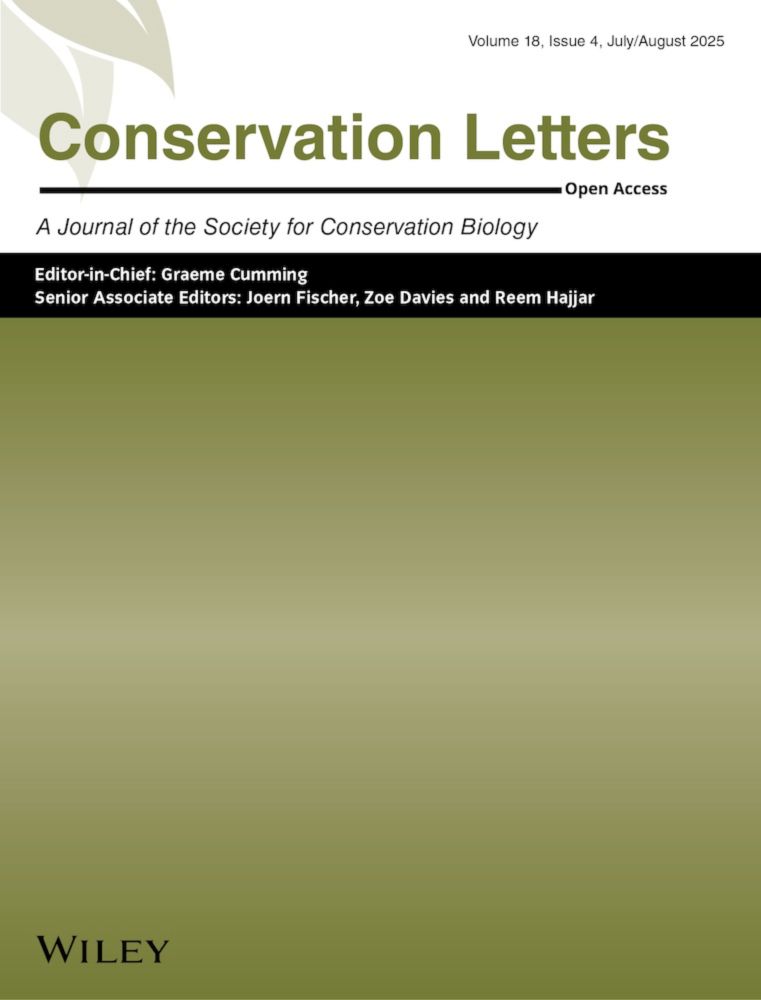
Beyond Species Richness for Biological Conservation
Recent global policy developments have highlighted the need for straightforward, robust, and meaningful biodiversity metrics. However, much of conservation science is dominated by the use of a single....
conbio.onlinelibrary.wiley.com
August 7, 2025 at 2:00 PM
Happy to share new work from the lab and a wonderful group of co-authors:
We argue that conservation biology needs to move beyond the current focus on species richness metrics.
While this has been argued before, we highlight the unappreciated impacts of using richness for a variety of problems:
We argue that conservation biology needs to move beyond the current focus on species richness metrics.
While this has been argued before, we highlight the unappreciated impacts of using richness for a variety of problems:
Reposted by Teja Tscharntke
"Conspecific vocalisations as a Wryneck conservation tool: if you play it, will they settle?"
The Applied Ecologist has published a blog featuring our new publication @aer-ese-bes.bsky.social
Enjoy reading!
tinyurl.com/d3cvh9p8
The Applied Ecologist has published a blog featuring our new publication @aer-ese-bes.bsky.social
Enjoy reading!
tinyurl.com/d3cvh9p8

Conspecific vocalisations as a Wryneck conservation tool: if you play it, will they settle?
Paula Schatte and co-authors share insight from their recent study examining the relative importance of food availability and conspecific vocalisations for breeding habitat selection during both th…
tinyurl.com
August 8, 2025 at 11:59 AM
"Conspecific vocalisations as a Wryneck conservation tool: if you play it, will they settle?"
The Applied Ecologist has published a blog featuring our new publication @aer-ese-bes.bsky.social
Enjoy reading!
tinyurl.com/d3cvh9p8
The Applied Ecologist has published a blog featuring our new publication @aer-ese-bes.bsky.social
Enjoy reading!
tinyurl.com/d3cvh9p8
Reposted by Teja Tscharntke
Gall midges and their parasitoids are abundant, megadiverse, and very hard to identify! Such "double dark taxa" systems present special challenges for ecology and agriculture. 🧵🧪🐙 @smnstuttgart.bsky.social @marinamoser.bsky.social @krogmann.bsky.social doi.org/10.1093/aesa...

Untangling host specialization in a “double dark taxa” system
Abstract. Platygastrine wasps (Hymenoptera: Platygastridae) are parasitoids of gall midges (Diptera: Cecidomyiidae). They and their hosts are exceptionally
doi.org
February 12, 2025 at 11:01 PM
Gall midges and their parasitoids are abundant, megadiverse, and very hard to identify! Such "double dark taxa" systems present special challenges for ecology and agriculture. 🧵🧪🐙 @smnstuttgart.bsky.social @marinamoser.bsky.social @krogmann.bsky.social doi.org/10.1093/aesa...
Reposted by Teja Tscharntke
Kürzlich ist ein Wildbienen-Artikel erschienen 🐝🐝
Autor*innen: Thomas Fechtler, Hanna Gardein (Julius-Kühn-Institut), Felix Kirsch @thuenen.de, Friederike Grau & Annika Haß @funcagroeco.bsky.social @unigoettingen.bsky.social & Fionn Pape.
▶️ www.researchgate.net/publication/...
Autor*innen: Thomas Fechtler, Hanna Gardein (Julius-Kühn-Institut), Felix Kirsch @thuenen.de, Friederike Grau & Annika Haß @funcagroeco.bsky.social @unigoettingen.bsky.social & Fionn Pape.
▶️ www.researchgate.net/publication/...


January 22, 2025 at 8:12 AM
Kürzlich ist ein Wildbienen-Artikel erschienen 🐝🐝
Autor*innen: Thomas Fechtler, Hanna Gardein (Julius-Kühn-Institut), Felix Kirsch @thuenen.de, Friederike Grau & Annika Haß @funcagroeco.bsky.social @unigoettingen.bsky.social & Fionn Pape.
▶️ www.researchgate.net/publication/...
Autor*innen: Thomas Fechtler, Hanna Gardein (Julius-Kühn-Institut), Felix Kirsch @thuenen.de, Friederike Grau & Annika Haß @funcagroeco.bsky.social @unigoettingen.bsky.social & Fionn Pape.
▶️ www.researchgate.net/publication/...
Reposted by Teja Tscharntke
#OpenAccess
Flowering synchrony and cultivar compatibility as key factors for optimising sweet cherry pollination and production
🍒 doi.org/10.1111/aab....
🌸 It's essential to include compatibility & regional flower phenology in orchard design 🌸
@catarinasiopa.bsky.social @jloureiro13.bsky.social
Flowering synchrony and cultivar compatibility as key factors for optimising sweet cherry pollination and production
🍒 doi.org/10.1111/aab....
🌸 It's essential to include compatibility & regional flower phenology in orchard design 🌸
@catarinasiopa.bsky.social @jloureiro13.bsky.social

Flowering synchrony and cultivar compatibility as key factors for optimising sweet cherry pollination and production
Effective pollination is crucial for sweet cherry production, as 82% of its yield depends on animal pollination. However, factors like flower phenology and cultivar compatibility are often overlooked...
doi.org
August 6, 2025 at 10:44 AM
#OpenAccess
Flowering synchrony and cultivar compatibility as key factors for optimising sweet cherry pollination and production
🍒 doi.org/10.1111/aab....
🌸 It's essential to include compatibility & regional flower phenology in orchard design 🌸
@catarinasiopa.bsky.social @jloureiro13.bsky.social
Flowering synchrony and cultivar compatibility as key factors for optimising sweet cherry pollination and production
🍒 doi.org/10.1111/aab....
🌸 It's essential to include compatibility & regional flower phenology in orchard design 🌸
@catarinasiopa.bsky.social @jloureiro13.bsky.social
Reposted by Teja Tscharntke
well I have since drawn a sweat bee, so can complete this #SciArt #invertebrates checkerboard 🐝

July 2, 2025 at 9:21 AM
well I have since drawn a sweat bee, so can complete this #SciArt #invertebrates checkerboard 🐝
Reposted by Teja Tscharntke
A beautiful female Mymar pulchellum parasitoid wasp of the Mymaridae found in Brede High Woods. This may be a common species but it is always worth a closer look!
#UKWildlife #wasps #Mymaridae #HighWeald
#UKWildlife #wasps #Mymaridae #HighWeald
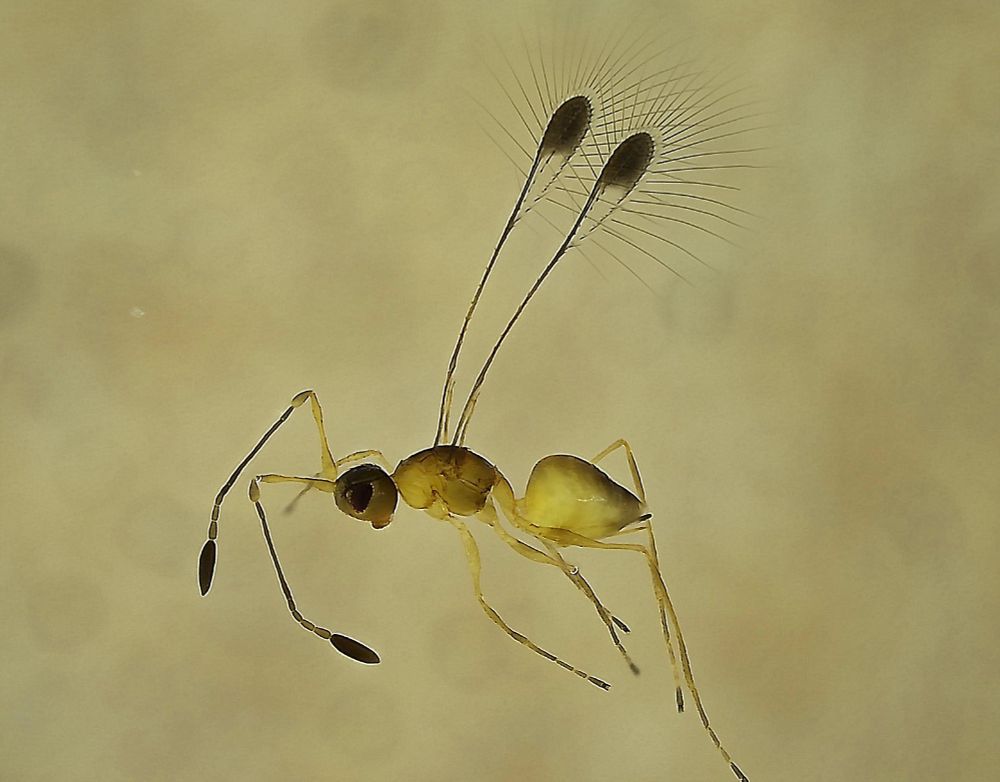
July 16, 2025 at 12:02 PM
A beautiful female Mymar pulchellum parasitoid wasp of the Mymaridae found in Brede High Woods. This may be a common species but it is always worth a closer look!
#UKWildlife #wasps #Mymaridae #HighWeald
#UKWildlife #wasps #Mymaridae #HighWeald


